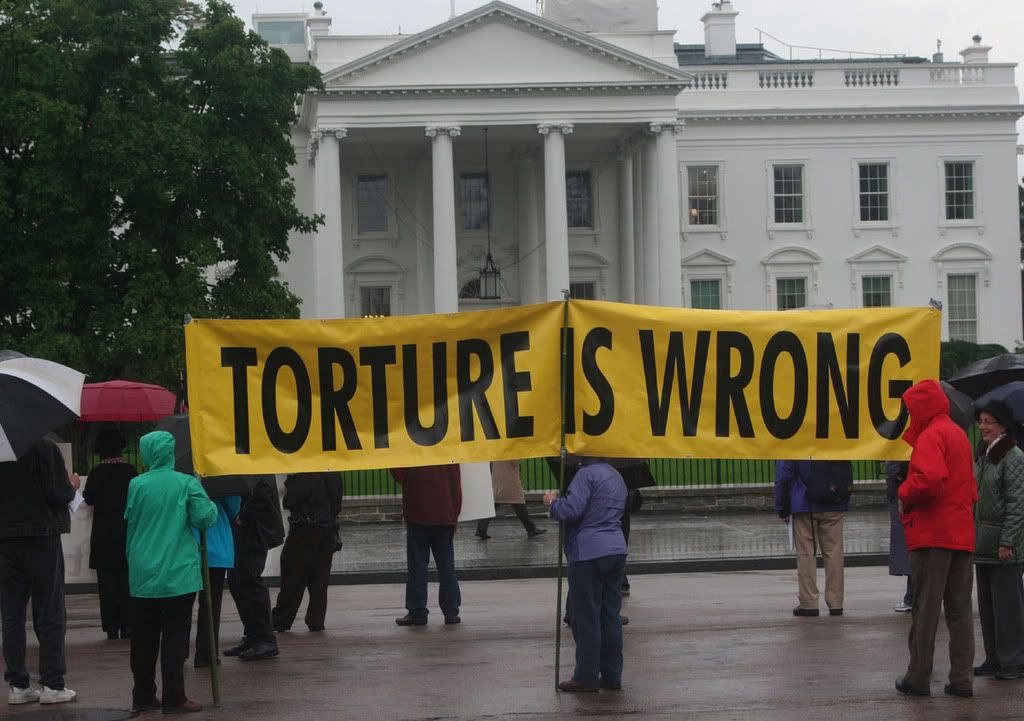Giving Torture A Bad Name
 The wholesale injection of human rights for combatants into war-making is a new phenomenon in world history and I suppose we should be proud of ourselves as a civilization for attempting to humanize war. (Perhaps I should have written "for attempting to de-humanize war," because over the course of human history, captured combatants have not expected that they would be treated humanely.)
The wholesale injection of human rights for combatants into war-making is a new phenomenon in world history and I suppose we should be proud of ourselves as a civilization for attempting to humanize war. (Perhaps I should have written "for attempting to de-humanize war," because over the course of human history, captured combatants have not expected that they would be treated humanely.)Whether it's humanizing or, in fact, de-humanizing, the use of torture on combatants, torture has gotten a bad name -- not just its morality, about which good people could argue subjectively, but also its efficacy, which in war-fighting is the more pertinent question. The ethics get clouded if torture is an efficient way to get information because if 100 good lives can be saved by torturing one scumbag, most people would find it ethical to torture the scumbag.
The first war I remember was the Vietnam war, and the use of torture became a major moral question in that war, a meme that continues with the war in Iraq, as we see in this 2005 WaPo column by Anne Applebaum:
Or listen to Army Col. Stuart Herrington, a military intelligence specialist who conducted interrogations in Vietnam, Panama and Iraq during Desert Storm, and who was sent by the Pentagon in 2003 -- long before Abu Ghraib -- to assess interrogations in Iraq. Aside from its immorality and its illegality, says Herrington, torture is simply "not a good way to get information." In his experience, nine out of 10 people can be persuaded to talk with no "stress methods" at all, let alone cruel and unusual ones. Asked whether that would be true of religiously motivated fanatics, he says that the "batting average" might be lower: "perhaps six out of ten." And if you beat up the remaining four? "They'll just tell you anything to get you to stop." ...Human rights advocates know they have to attack the utility of torture, or we will put our self-preservation ahead of how a tortured detainee is feeling about sleep deprivation or electric genital stimulation at the moment. The media have by and large accepted the inefficacy characterization without question, but we've known better, haven't we? If torture didn't work, it would not be used, right? Humans aren't dummies; they adapt through experience, improving on things that do work and abandoning those that don't.
An up-to-date illustration of the colonel's point appeared in recently released FBI documents from the naval base at Guantanamo Bay, Cuba. These show, among other things, that some military intelligence officers wanted to use harsher interrogation methods than the FBI did. As a result, complained one inspector, "every time the FBI established a rapport with a detainee, the military would step in and the detainee would stop being cooperative." So much for the utility of torture.
Reader Karl Lembke, who usually writes at Mens News Daily, responded to my post Over-Thinking America with a link to his blog, Right Wing Techno-Pagan, wherein he discusses this very subject, thanks to an NYT story from April that, whether it wanted to or not, rebuts the argument that torture is ineffective. Here's that story:
In one of the new joint American-Iraqi security stations in the capital this month, in the volatile Ghazaliya neighborhood, Capt. Darren Fowler was heaping praise on his Iraqi counterparts for helping capture three insurgent suspects who had provided information he believed would save American lives.
“The detainee gave us names from the highest to the lowest,” Captain Fowler told the Iraqi soldiers. “He showed us their safe houses, where they store weapons and I.E.D.’s and where they keep kidnap victims, how they get weapons, where weapons come from, how they place I.E.D.’s, attack us and go away. Because you detained this guy this is the first intelligence linking everything together. Good job. Very good job.”
The Iraqi officers beamed. What the Americans did not know and what the Iraqis had not told them was that before handing over the detainees to the Americans, the Iraqi soldiers had beaten one of them in front of the other two, the Iraqis said. The stripes on the detainee’s back, which appeared to be the product of a whipping with electrical cables, were later shown briefly to a photographer, who was not allowed to take a picture.
To the Iraqi soldiers, the treatment was normal and necessary. They were proud of their technique and proud to have helped the Americans.
“I prepared him for the Americans and let them take his confession,” Capt. Bassim Hassan said through an interpreter. “We know how to make them talk. We know their back streets. We beat them. I don’t beat them that much, but enough so he feels the pain and it makes him desperate.” …
Beatings like this, which are usually hard to verify but appear to be widespread given the fears about the Iraqi security forces frequently expressed by ordinary Iraqis, present the Americans with a largely undiscussed dilemma.
The beaten detainee, according to Captain Fowler, not only led the Americans to safe houses believed to be used by Al Qaeda in Mesopotamia but also confessed to laying and detonating roadside bombs along a section of road heavily traveled by American patrols. Just a month ago, four soldiers from Captain Fowler’s regiment died on that road after the explosion of a large, deeply buried bomb, possibly made in the bomb factory that the Americans were able to dismantle because of the detainee’s information, Captain Fowler said.
 So here we have one scumbag tortured to an extent modest enough that his injuries were not immediately evident to the Americans, giving up information that saved the lives of better people than he. Do we become people as reprehensible as him if we allow some punishment that, while cruel, is not particularly unusual in this world? If you answered yes to that question, consider what we found in this scumbag's house:
So here we have one scumbag tortured to an extent modest enough that his injuries were not immediately evident to the Americans, giving up information that saved the lives of better people than he. Do we become people as reprehensible as him if we allow some punishment that, while cruel, is not particularly unusual in this world? If you answered yes to that question, consider what we found in this scumbag's house:Still, the NYT account includes this:After interrogating Mr. Jassam, a thin young man wearing a blue and red warm-up outfit, for much of the night, the Americans took him to point out one of the houses where the Qaeda militants made bombs. When the Americans arrived, a half-eaten lunch was on the table next to a couple of detonators and some blasting wire. The insurgents appeared to have been gnawing on chicken and flat bread while making fuses for I.E.D.’s, improvised explosive devices, the military’s term for the roadside bombs found here.
On the table and in bags on the floor were mountains of soap, which can be used in homemade explosives. Blasting wire lay in coils. Buried in the garden were two large antiaircraft guns known as Duskas, three propane tanks, and an oxygen tank that was partly cut in preparation for being turned into a huge bomb, probably similar to the one that killed the four soldiers. On the roof a large pile of homemade explosives was drying in the sun.
The use of torture by American soldiers and contractors at Abu Ghraib only compounded Iraqi hatred of Americans and further undermined American moral claims in Iraq. It also produced little valuable information. Most experts, including in the military, say they believe that coerced confessions are an unreliable way to learn about enemy operations because people being tortured will often say whatever they think it will take to stop the pain…Which is it? Did the detainee lead us to a bomb factory, or does torture lead to unreliable information?
Of course, it was the latter, which it often is. Does this mean we should embrace torture? Of course not; it's not that black and white; we're not that black and white.
America the Over-Thought will perpetually think through things like this. And what we will find is an appropriate balance, as we always do, because we have liberals, who believe more government is good for the people and we have conservatives, who question the imposition of big government at the cost of human free will.
When it comes to torture, we have much more to fear from the liberals than we do from the conservatives. Just turn back the clock a few decades: How many were tortured under the government-first "liberal"' thinking of the USSR vs. under the people-first "conservative" thinking of the US?
Labels: War in Iraq, War on Terror




<< Home